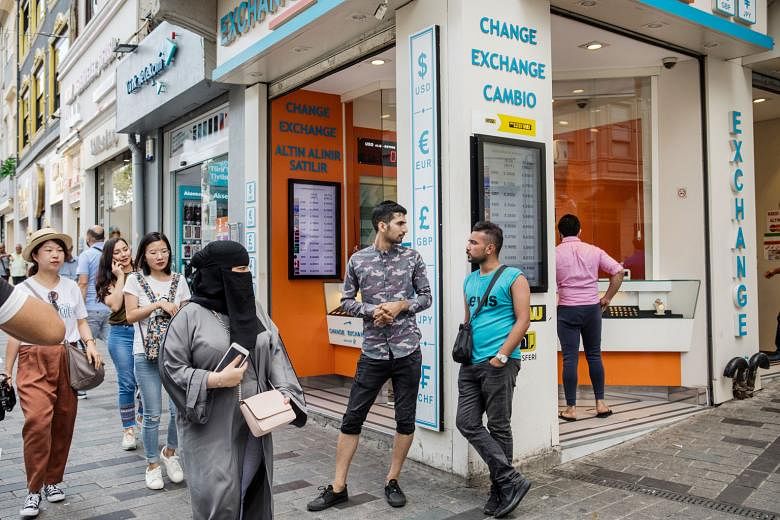ISTANBUL • Turkish banks are pulling back on credit to consumers and businesses. Power plants have shut down because of the soaring cost of imported fuel.
Building projects in Istanbul stand half-finished after their backers ran out of money.
And in a shopping mall beneath Istanbul's Trump Tower, Mr Cenap Sarialioglu said he worries that he will not be able to supply customers at his pharmacy with the prescription medicine they need to stay alive.
Mr Sarialioglu, who is also president of the Istanbul chamber of pharmacists, said he has been getting calls from other pharmacists concerned that wholesalers will cut off supplies of crucial medications because they can no longer make a profit.
Medicine prices are set in Turkey, so the sharp drop in the lira has made it costly to import pharmaceuticals. "Starting next month, we may have problems," Mr Sarialioglu said. "An urgent solution is needed."
It has never been easy doing business on the edge of the war zone, in a country with its own rough politics, eye-popping inflation and volatile currency.
But in recent weeks the challenges facing Turkish banks and businesses have acquired a new level of intensity that is visible from the streets of Istanbul to the global financial markets.
The lira's plunge in value, exacerbated by a dispute with the US over a detained pastor, has exposed economic pressures that have been gathering for years.
And some economists say they could be reaching a breaking point. Over the past decade, businesses gorged on cheap debt, which is harder to pay back as the lira falls, while banks handed out credit cards like party favours. "A recession is inevitable," said Associate Professor Selva Demiralp at Koc University in Istanbul. "The question is whether it's going to be a soft landing or a hard landing."
Turkey's problems are so acute, she said, that only drastic measures would stabilise the lira and contain official inflation of almost 16 per cent. She added that the central bank would need to raise the official interest rate to about 28 per cent, from 17.75 per cent.
But the government of President Recep Tayyip Erdogan, who is widely perceived as controlling the central bank, has shown no willingness to allow even a more modest rate increase or to curtail government spending on public works.
Government countermeasures so far have been regarded as tepid.
Bank regulators on Thursday announced limits on consumers' purchases made with credit.
The central bank relaxed rules on the amount of money commercial banks need to keep in reserve, to free up cash they can use to deal with currency market turmoil. The government has insisted it will not restrict how much money Turks can transfer out of the country.
In a conference call with investors on Thursday, Turkish Finance Minister Berat Albayrak insisted the banking system was healthy and promised measures that would bring inflation down to single digits.
He offered few specifics, according to reports in Turkish and international media, and he ruled out assistance from the International Monetary Fund - a step many analysts said will be essential to stabilise the economy.
Meanwhile, the Daily Mail reported that people in Turkey are boycotting and destroying popular American products to protest the US increasing import tariffs.
Videos on social media show iPhones being smashed with a hammer, while another clip features a boy pouring the contents of a Coca-Cola bottle into a toilet.
A recession in Turkey would bring to an end nearly two decades of uninterrupted growth. Most young people do not remember the last serious downturn in 2001. Since then, the country has cut poverty in half, brought millions of people into the middle class and, until recently, been embraced as a darling of international investors.
But the growth was built largely on a construction boom fuelled by easy credit and government spending. The success story is looking increasingly unsustainable.
In a narrow shop in Istanbul where he trades gold and silver, Mr Gabriel Saglamoglu was defiant. "The Turkish economy is not going to be destroyed by a single tweet," he said, referring to US President Donald Trump's Twitter announcement last week that he would impose higher steel tariffs.
Pharmacist Sarialioglu said he worried about shortages of cancer medicine. They are almost always imported. "In oncology, there are no substitutes," he said. "If the treatment does not happen efficiently and right away, one may have irreversible consequences."
NYTIMES


